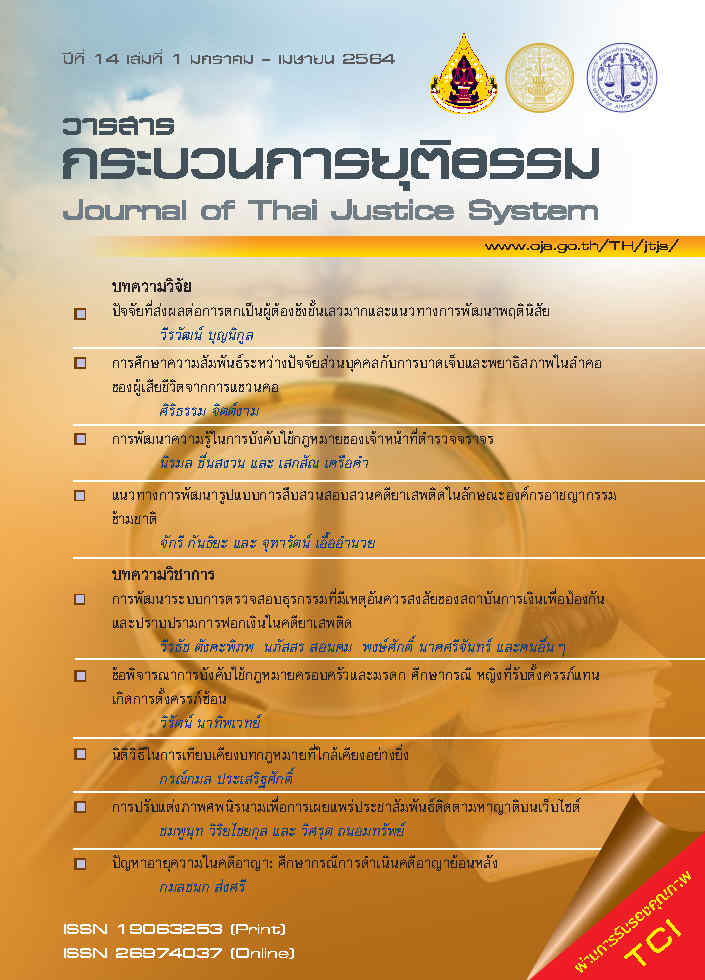ปัญหาอายุความในคดีอาญา: ศึกษากรณีการดำเนินคดีอาญาย้อนหลัง
Main Article Content
บทคัดย่อ
กฎหมายอายุความคดีอาญาใช้บังคับย้อนหลังได้หรือไม่ ยังคงเป็นประเด็นที่นักวิชาการนิติศาสตร์ไทย ฝ่ายตุลาการ และฝ่ายนิติบัญญัติ เห็นต่างกัน ทั้งนี้เนื่องมาจากความเห็นของแต่ละฝ่ายในการกำหนดสถานะของกฎหมายอายุความคดีอาญาที่ต่างกัน ทำให้ใช้บังคับย้อนหลังได้หรือไม่ต่างกันไปด้วย หากเห็นว่ากฎหมายอายุความคดีอาญามีสถานะเป็นกฎหมายสารบัญญัติ จะขยายอายุความย้อนหลังเป็นผลร้ายแก่จำเลยมิได้ แต่หากเห็นว่ากฎหมายอายุความคดีอาญามีสถานะเป็นกฎหมายวิธีสบัญญัติ จึงบังคับใช้กฎหมายอายุความย้อนหลังได้ทันทีไม่ว่าจะเป็นผลร้ายหรือผลดีแก่จำเลยก็ตาม ดังนั้น การกำหนดสถานะของกฎหมายอายุความคดีอาญาจึงมีความสำคัญ ประเทศไทยควรหาข้อยุติให้ได้ว่ากฎหมายอายุความฟ้องคดีอาญาควรเป็นกฎหมายสารบัญญัติหรือกฎหมายวิธีสบัญญัติ เพื่อประโยชน์สุดท้ายคือ ความเป็นเอกภาพของกฎหมายอายุความคดีอาญาของประเทศไทย ที่ไม่สับสนในการใช้และการบัญญัติกฎหมายอีกต่อไป
บทความนี้ได้ทำการศึกษาเอกสารและวิเคราะห์ว่ากฎหมายต่างประเทศ โดยจะมุ่งศึกษาเฉพาะสถานะของอายุความฟ้องคดีอาญาเท่านั้น ผลของการศึกษาสามารถแบ่งออกเป็น 2 กลุ่มความเห็น คือ 1) กลุ่มที่เห็นว่ากฎหมายอายุความคดีอาญามีสถานะเป็นกฎหมายสารบัญญัติ จึงอยู่ภายใต้บังคับหลักกฎหมายอาญาไม่มีผลย้อนหลัง ซึ่งสอดคล้องกับความเห็นของศาลฎีกาไทย ประเทศในกลุ่มนี้ ได้แก่ ประเทศฮังการี ประเทศอิตาลี และประเทศโปรตุเกส และ 2) กลุ่มที่เห็นว่ากฎหมายอายุความคดีอาญามีสถานะเป็นกฎหมายวิธีสบัญญัติ จึงอยู่ภายใต้หลักการใช้บังคับทันทีของกฎหมายวิธีพิจารณาความอาญาและหลักสิทธิที่ได้มาแล้วของจำเลย (acquired right) ซึ่งสอดคล้องกับความเห็นของนักวิชาการนิติศาสตร์ไทย ประเทศในกลุ่มนี้ ได้แก่ ประเทศสหรัฐอเมริกา ประเทศฝรั่งเศส ประเทศเยอรมนี ประเทศเนเธอร์แลนด์ และสาธารณรัฐเช็ก เป็นต้น
อย่างไรก็ตาม เมื่อพิจารณาลักษณะของกฎหมายอายุความคดีอาญา บทความนี้ได้โต้แย้งว่า กฎหมายอายุความคดีอาญาควรมีลักษณะเป็นกฎหมายวิธีสบัญญัติ และอยู่ภายใต้หลักการใช้บังคับทันทีของกฎหมายวิธีพิจารณาความอาญา ดังนั้น กฎหมายอายุความคดีอาญาจึงไม่ควรอยู่ภายใต้บังคับของหลักเกณฑ์ที่ใช้กับกฎหมายสารบัญญัติ อันได้แก่หลักกฎหมายอาญาไม่มีผลย้อนหลังหรือสิทธิในกระบวนการยุติธรรมตามรัฐธรรมนูญ ผลคือกฎหมายอายุความคดีอาญาฉบับใหม่มีผลใช้บังคับกับคดีอาญาที่เกิดขึ้นก่อนกฎหมายใหม่มีผลใช้บังคับด้วย รวมถึงใช้บังคับกับคดีอาญาที่เกิดขึ้นนับแต่กฎหมายใหม่มีผลใช้บังคับเป็นต้นไป ไม่ว่ากฎหมายอายุความคดีอาญาฉบับใหม่จะเป็นผลร้ายหรือผลดีแก่จำเลยเมื่อเทียบกับกฎหมายฉบับเก่า อย่างไรก็ตาม มีข้อยกเว้นว่ากฎหมายอายุความคดีอาญาใหม่นั้นไม่มีผลต่อคดีที่ขาดอายุความไปแล้วในขณะที่กฎหมายใหม่นั้นมีผลใช้บังคับ ดังนั้น แม้ว่ากฎหมายอายุความคดีอาญาใหม่จะกำหนดอายุความที่ยาวกว่าซึ่งอาจทำให้คดีที่ขาดอายุความไปแล้วกลายเป็นคดีที่ไม่ขาดอายุความ แต่ก็ไม่อาจย้อนหลังไปรื้อคดีที่ขาดอายุความไปแล้วกลับมาพิจารณาใหม่ได้ ตามหลักสิทธิที่ได้มาแล้วของจำเลย (acquired right)
ท้ายที่สุด บทความนี้เสนอแนะให้มีการกำหนดกฎเกณฑ์เกี่ยวกับอายุความฟ้องคดีอาญา หรือแก้ไขกฎเกณฑ์ในเรื่องนี้ที่มีอยู่แล้ว ให้สอดคล้องกับข้อโต้แย้งของบทความข้างต้น โดยกำหนดให้กฎเกณฑ์ใหม่เกี่ยวกับอายุความฟ้องคดีอาญามีผลใช้บังคับทันทีกับคดีที่เกิดขึ้นก่อนการบังคับใช้กฎเกณฑ์ใหม่นั้นด้วย เว้นแต่อายุความฟ้องคดีอาญาของคดีนั้นจะขาดไปแล้ว เพื่อให้สถานะของกฎหมายอายุความคดีอาญาถูกต้องตามหลักกฎหมายและเหมาะสมกับประเทศไทย และทำให้แนวทางการพิจารณาในเรื่องนี้มีความเป็นเอกภาพในระบบกฎหมายไทย
Article Details
ต้นฉบับที่ได้รับการตีพิมพ์ในวารสาร เป็นลิขสิทธิ์ของวารสารกระบวนการยุติธรรม แต่ความคิดเห็นที่ปรากฏในเนื้อหาของบทความในวารสารกระบวนการยุติธรรม ถือเป็นความรับผิดชอบของผู้เขียนแต่เพียงผู้เดียว
เอกสารอ้างอิง
เกียรติขจร วัจนะสวัสดิ์. (2551). กฎหมายอาญา ภาค 1 บทบัญญัติทั่วไป (พิมพ์ครั้งที่ 10). กรุงเทพฯ: พลสยาม พริ้นติ้ง.
ขจรศักดิ์ สิริพัฒนกรชัย. (2560). ปิยบุตร แสงกนกกุล: ทำความรู้จัก ศาลฎีกาคดีอาญานักการเมือง. ค้นเมื่อ 30 มีนาคม 2562. จาก https://prachatai.com/journal/2017/07/72552
ณรงค์ ใจหาญ. (2552). หลักกฎหมายวิธีพิจารณาความอาญา เล่ม 1 (พิมพ์ครั้งที่ 10). กรุงเทพฯ: วิญญูชน.
ทวีเกียรติ มีนะกนิษฐ. (2559) สังคมกับกฎหมาย (พิมพ์ครั้งที่ 5). กรุงเทพฯ: วิญญูชน.
ปกป้อง ศรีสนิท. (2561). หลักการใช้บังคับทันทีของกฎหมายวิธีพิจารณาความอาญา. ใน วีรวัฒน์ จันทโชติ (บรรณาธิการ), หนังสือรวมบทความทางวิชาการที่ระลึก 60 ปี พี่ใหญ่ ใจหาญ (น. 219-242), กรุงเทพฯ: เดือนตุลา.
วาทิน หนูเกื้อ. (2539). มาตรการเสริมในทางอาญา. วิทยานิพนธ์มหาบัณฑิต. มหาวิทยาลัยธรรมศาสตร์.
วิไลลักษณ์ ศรีสุกใส. (2553). การมีผลใช้บังคับย้อนหลังของกฎหมายภาษีอากรไทย. วิทยานิพนธ์มหาบัณฑิต. มหาวิทยาลัยธรรมศาสตร์.
สหธน รัตนไพจิตร. (2527). ความประสงค์ของการลงโทษทางอาญา: ศึกษาเฉพาะประเทศไทยสมัยใช้กฎหมายลักษณะอาญาและประมวลกฎหมายอาญา. วิทยานิพนธ์นิติศาสตรมหาบัณฑิต. มหาวิทยาลัยธรรมศาสตร์.
สิทธิพร เศาภายน. (2556). สิทธิในกระบวนการยุติธรรมตามรัฐธรรมนูญ มาตรา 39. ใน เอกสารวิชาการส่วนบุคคลในการฝึกอบรมหลักสูตรหลักนิติธรรมเพื่อประชาธิปไตย รุ่นที่ 1. กรุงเทพฯ: สำนักงานศาลรัฐธรรมนูญ.
หนังสือต่างประเทศ
Directorate-General for Library Research and Documentation. (2017). Research Note on Limitation rules in criminal matters. ค้นเมื่อ 2 กุมภาพันธ์ 2563. จาก https://curia.europa.eu/jcms/upload/docs/application/pdf/2019-12/ndr-2017 005_synthese_en_neutralisee_finale.pdf
Kok, R. A. (2007). Statutory limitations in international criminal law. The Hague: TMC Asser Press.


